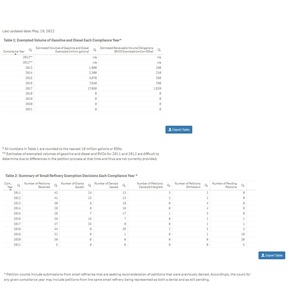EPA: No new SRE petitions filed, 69 SRE petitions remain pending

May 19, 2022
BY Erin Krueger
Data released by the U.S. EPA on May 19 shows that for the fourth consecutive month, no new small refinery exemption (SRE) petitions were filed under the Renewable Fuel Standard. The agency took no action on the 69 SRE petitions that have been pending since at least mid-January.
According to the EPA’s online SRE dashboard, there are currently five SRE petitions pending for compliance year 2021, 30 SRE petitions pending for compliance year 2020, 29 SRE petitions pending for compliance year 2019, three SRE petitions pending for compliance year 2018, one SRE petition pending for compliance year 2017, and one SRE petition pending for compliance year 2016.
Advertisement
The EPA on Dec. 7 proposed to deny more than 60 pending SRE petitions. The agency said the proposed decision results from its review of the pending SRE petitions and supporting information; its legal technical and policy analysis of the Clean Air Act provisions relating to small refineries; and its application of the holdings of the U.S. Court of Appeals for the Tenth Circuit in Renewable Fuels Association et al. v. EPA.
A public comment period on the proposal was open through Feb. 7. According to information published on Regulations.gov, the EPA received nearly 250 public comments on its SRE proposal.
The EPA in April denied 36 small refinery exemption (SRE) petitions for compliance year 2018 that were remanded by the U.S. Court of Appeals for the D.C. Circuit. Those 36 SREs included 31 that were originally approved and five that were originally denied. The agency overturned the 31 approvals, denying all 36 SRE petitions. The 31 small refineries whose previously approved SREs were overturned, however, will not need to purchase or redeem additional renewable identification numbers (RINs) to comply with RFS renewable volume obligations (RVOs) for 2018. The agency is instead allowing those 31 small refineries to use an “alternative compliance approach.”
Advertisement
Related Stories
CountryMark on July 22 celebrated the completion of more than $100 million in upgrades at its refinery in Indiana, including those related to soybean oil storage. The facility produces renewable diesel via coprocessing technology.
ATOBA Energy and Air Moana are partnering to implement scalable solutions for the supply of SAF. The collaboration aims to ensure long-term SAF availability while supporting local initiatives to develop sustainable fuel production in Tahiti.
While final IRS guidance is still pending, the foundation of the 45Z program is well defined. Clean fuel producers should no longer be waiting; they can now move forward with critical planning and preparation, according to EcoEngineers.
Neste Corp. on July 24 released second quarter results, reporting record quarterly renewable product sales volumes despite weaker margins. SAF sales were up nearly 80% when compared to the first quarter of 2025.
Valero Energy Corp. on July 24 released second quarter results, reporting a profitable three-month period for its ethanol segment. The renewable diesel segment posted a loss, but the company’s new sustainable aviation fuel (SAF) unit operated well.
Upcoming Events










